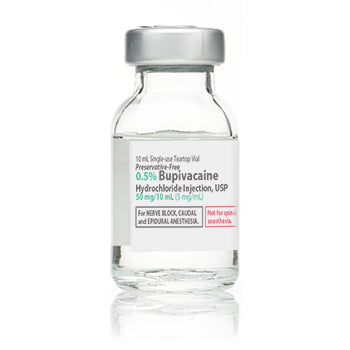Bupivacaine 0.5% for Injection Single-Dose 10 mL Vial, 25/tray (Rx)
(Note: We don’t Fill Personal Prescriptions)
How to Order:
Bupivacaine 0.5% for Injection Single-Dose 10 mL is utilized as a local anesthetic for managing pain during surgical procedures, obstetrical procedures like epidurals, and post-operative pain management. It works by blocking nerve impulses, providing prolonged numbness, and pain relief in targeted areas. Bupivacaine is favored for its long-lasting anesthetic effects, making it suitable for lengthy operations and labor analgesia. Administered via nerve blocks, it ensures effective pain control, enhancing patient comfort and facilitating smoother surgical experiences.
Bupivacaine 0.5% for Injection is a sterile, preservative-free local anesthetic solution used for regional anesthesia. The product is designed to produce prolonged anesthesia for surgical, obstetric, or procedural interventions by blocking nerve impulses. It comes in 10 mL single-dose vials, and each tray contains 25 vials, provided by Pfizer Injectables.
Details and Features:
Volume: 10 mL per vial
Packaging: 25 single-dose vials per tray
Concentration: Bupivacaine Hydrochloride 0.5% (5 mg/mL)
Preservative-Free: Ideal for reducing the risk of preservative-related toxicity or allergic reactions
Use: Suitable for local or regional anesthesia during a variety of surgical procedures, as well as for acute pain management
Mechanism of Action:
Bupivacaine acts as a local anesthetic by inhibiting sodium ion influx through voltage-gated sodium channels in neuronal membranes. This blockade prevents depolarization of the nerve cell membrane, interrupting the generation and conduction of nerve impulses responsible for sensation. As a result, there's a reversible loss of sensation in the targeted area, allowing effective pain control during procedures. Bupivacaine is known for its prolonged duration of action compared to other local anesthetics.
Warnings:
-
Allergic Reactions: Contraindicated in patients with a known hypersensitivity to bupivacaine or other amide-type local anesthetics.
-
Cardiovascular/CNS Toxicity: High doses or intravascular injection may result in systemic toxicity, manifesting as central nervous system (CNS) symptoms like seizures, and cardiovascular symptoms like arrhythmias. Facilities for resuscitation should be immediately available.
-
Proper Administration: Only for use by healthcare professionals experienced in regional anesthesia techniques. Avoid intravascular injection by frequent aspiration checks.
-
Contraindications: Not recommended for intravenous regional anesthesia (Bier Block) due to risk of cardiac arrest and death.
- Special Populations: Dose adjustments may be necessary for elderly patients, those with liver disease, and others with reduced tolerance to local anesthetics.
Side Effects:
Potential side effects associated with the use of Bupivacaine 0.5% may include:
-
Local Reactions: Pain, swelling, or irritation at the injection site.
-
Systemic Reactions: Central nervous system reactions, such as dizziness, lightheadedness, confusion, or more severe symptoms like seizures, if toxic levels are reached.
-
Cardiovascular Effects: Hypotension, bradycardia, or heart block, particularly with high plasma levels.
-
Respiratory Effects: Difficulty breathing or respiratory depression, especially in higher doses affecting the thorax or cervical region.
- Allergic Reactions: Although rare, hypersensitivity reactions such as rashes or anaphylaxis can occur.
Bupivacaine should always be administered with caution, adhering to appropriate dosing protocols tailored to the patient's specific condition, and it requires careful monitoring during and after administration to identify and manage potential adverse effects promptly.


